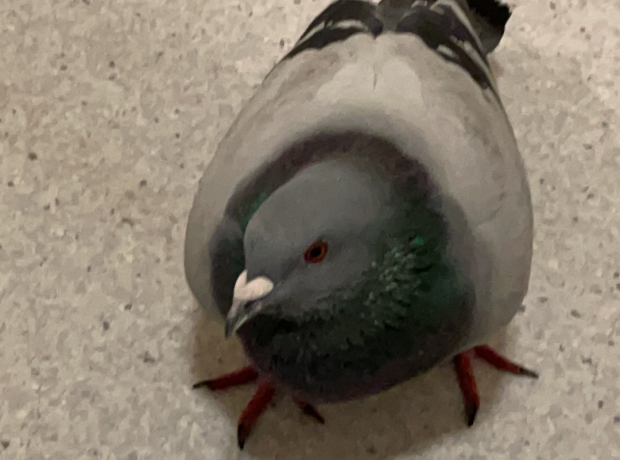Links to vets in Guernsey
Local useful links
Website donated by:

Some love to see pigeons around Guernsey and others think of them as pests but regardless of your thoughts the GSPCA have seen a sharp incline of sick and injured pigeons especially in and around St Peter Port.
With worries of a number of bird diseases at this time of year from Avian Flu to Newcastle’s Disease the GSPCA have been monitoring the sick and injured birds that come into the care of the Shelter and since the start of 2021 we have seen 100% increase with sick pigeons many showing neurological symptoms.
The GSPCA is working with the States Vets and monitoring the situation closely and all sick birds are placed in isolation facilities at the GSPCA.
Beckie Bailey GSPCA Animal Care Assistant said “We have seen so many sick pigeons in the last few weeks with really concerning ailments we have been working with the States Vet to determine what it might be.”
“Many of the birds are coming in from St Peter Port and we have again had quite a few in today and yesterday.”
“Often the birds are very weak and unable to fly.”
“Please do not pick the birds up without wearing gloves, a face mask and washing your hands after to be as safe as you can.”
Steve Byrne GSPCA Manager said “We help over 1500 birds every year at the GSPCA and we are always monitoring the numbers arriving and comparing to previous years and we have had more sick pigeons in the last month anytime in the last ten years.”
“We do sometimes see spikes that can be explained but these birds are showing neurological symptoms and we have had reports of deceased pigeons so we have been working with the States Vets to try and find the cause.”
“We are all quite use to gloves, face mask and personal protective equipment and if you find a sick bird we are running our essential 24/7 animal ambulance and emergency service.”
“If you can place the bird in a box with some air holes or wrap it in something then call us on 01481 257261 immediately to see the best way to get the poorly bird to us complying with covid restrictions.”
“Most years we see an average of 18 pigeons between 1st January and 4th February so to see 42 especially the vast majority from our main town is extremely concerning.”
“We have seen increasing numbers of pigeons in recent years but the majority are often young birds in the summer months which do include poorly racing pigeons which we return to the owners.”
“At present we have 24 pigeons which are under our care from those that have just arrived to some almost ready for the wild and we are working hard to do all we can for the 300+ animals in our care.”
“There could be even more birds arrive as we are not yet at the end of the day on the 4th and hopefully the increase isn’t anything serious but we are monitoring the situation and working with the authorities.”
“We will of course keep everyone up to date on any findings and wanted to ask everyone to keep an eye out for poorly birds.”
“With such difficult times we really need your support and to donate to our work and the care of the many animals please call 01481 257261, at the GSPCA, Rue des Truchots, St Andrews, Guernsey GY6 8UD or online https://giving.gg/donate/event/5876/GSPCA-Coronavirus-Emergency-Appeal .”
“To help ensure we can help animals 24/7 why not become a regular sponsor to help animals like the 3 seal pups during these extremely difficult days and to find out more please visit http://www.gspca.org.gg/sites/default/files/Angel%20sponsor%20form%20special%202018%20new.pdf .”
“For advice on what to do if you find injured wildlife please visit https://www.gspca.org.gg/animals/wildlife-advice or call us 24/7 on 01481 257261.”
|
Year |
Number of pigeons in between 1st January and 4th February |
Total numbers |
|
2021 |
42 |
N/A |
|
2020 |
21 |
376 |
|
2019 |
25 |
464 |
|
2018 |
12 |
278 |
|
2017 |
21 |
331 |
|
2016 |
12 |
222 |
|
2015 |
13 |
196 |
|
2014 |
30 |
214 |
|
2013 |
14 |
199 |
|
2012 |
17 |
179 |
Some facts about pigeons –
In line with States of Guernsey advice please DO NOT visit the GSPCA if have been outside of the Bailiwick of Guernsey in line with their advice or have any symptoms of Coronavirus and we continue visits to the Shelter for only essential reasons and to please call us on 01481 257261 or email [email protected] before your trip to see if we can help without you coming to the Shelter. For the latest information and advice please visit http://www.gspca.org.gg/search/node/coronavirus
With huge challenges on our resources and a drop in income from boarding and donations please help us help animals in Guernsey with our #GSPCACoronavirusCrisisAppeal by donating online via - https://giving.gg/donate/event/5876/GSPCA-Coronavirus-Emergency-Appeal
During these difficult times help us help animals in need. From donating to Sponsoring a Pen, Buying a Brick for the much needed Wildlife Hospital to our Amazon and main page Wish List, holding a mufti day to a sponsored Christmas dip, here are some of the ways you could help give animals joy.



Links to vets in Guernsey
Local useful links
Website donated by:
Post new comment
More information about formatting options